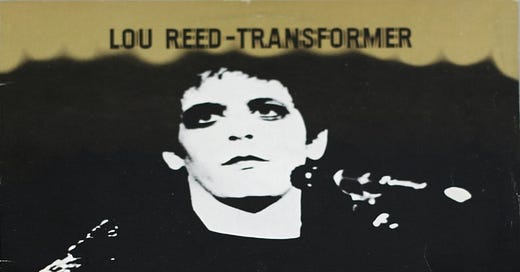There are two songs on Transformer that saxophonist Ronnie Ross plays on; the first is baritone part at the end of 'Walk On The Wild Side' that you are probably playing in your head as you read these words. The second is a soprano sax on the closing track 'Goodnight Ladies'. Ronnie Ross also played baritone saxophone on 'Savoy Truffle', George Harrison's ode on The White Album to his sweet tooth, and was a tutor for a young David Bowie. Bowie, of course, was a producer on Transformer along with Mick Ronson.
This song is one of several tracks we will cover at The Run Out Grooves that could only be a closing track. I mean, it's called 'Goodnight Ladies' for a start. Even without the title, it is a camp show-tune that could only come just before the curtain falls. Like the Velvet Underground's similarly succinct 'After Hours' and 'I'm Sticking With You' is removed from the usual output/rest of the album. There is undoubtedly an element of flamboyant and arch-knowing that even then would have been half a wink at the audience with Herbie Flowers’ ridiculous tuba accompanying the song.
There are a couple of assumed literary allusions in the song. 'Goodnight, Ladies' is a minstrel folk song written in 1847 by Edwin Pearce Christy that found a new lease of life thanks to its inclusion in The Music Man Broadway show. The inclusion of "good night, sweet ladies" later in Reed's song make a nod not only to T.S. Elliot's 1922 epic The Wasteland but one more nested reference back to Ophelia's last lines in Hamlet.
What I like about it is one hand, you have the overt oompah stylings and an unsuccessful attempt to woe some ladies who have run out of lemon to accompany their tequila. On the other, you have the Shakespeare and T.S. Eliot references and the somewhat self-pitying juxtaposition of the star of the song watching late-night network news. A few years previous, someone else in Bowie's orbit was telling us all about being sized up by a 'TV Eye'1 and here's Reed's protagonist at home with his TV Dinner, lamenting what might have been. The protagonist's failure is a novel change from Reed's many tales of hedonism that pepper both his solo career and time in The Velvet Underground. To get the set-up and plan only to be left with the failed execution and cold reality is a world away from what goes in in 'Venus in Furs' or 'Sister Ray'.
Transformer itself is the sound of Reed reflecting the Glam Rock music, heavily influenced by his band in the first place. It doesn't shimmer and shine as the best of the offerings from the UK at that time do; it more represents Reed trying on a jacket that may not have been tailor-made for him but was a perfect fit, and he wore it well.
Another trope we will be looking at in this series is album closers that set things up nicely for future records. Like a good season finale combines elements of that season, it should also lay some foundations for the next one. The overall atmosphere of 'Goodnight Ladies' readily brings to mind the 1972 film Cabaret. The seedy, smoke-filled nightclubs in the last days of the Weimar Republic in 1931 are not in any sense a musical preparation for the future, but the concept of the divided German city would be the inspiration for the title of Reed's next album, 1973's Berlin.
Thanks again for spending a few minutes reading, it would be great if you could continue to spread the word.
They’ll be another post later this week on Dusty Springfield.
According to Please Kill Me: The Uncensored Oral History of Punk by Legs McNeil and Gillian McCain, “T.V. Eye” was a code Stooges Ron and Scott Asheton’s sister used with her friends to describe a guy she liked. If one of the girls liked a guy they had a T.V. Eye on them. Supposedly, “T.V.” stood for “Tw*t Vibe.”




